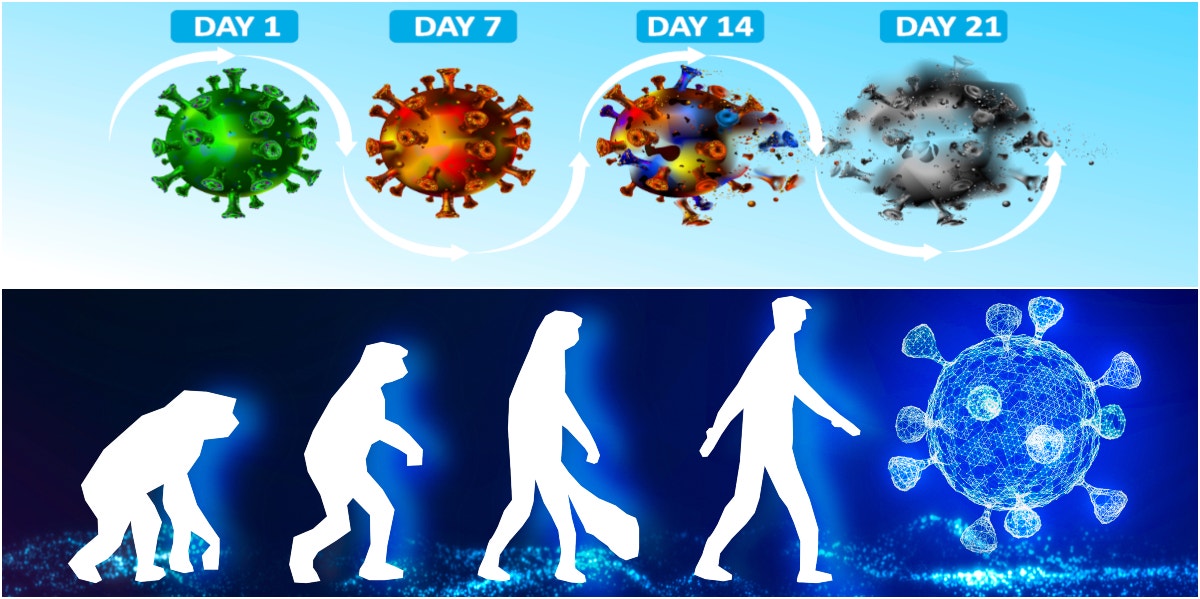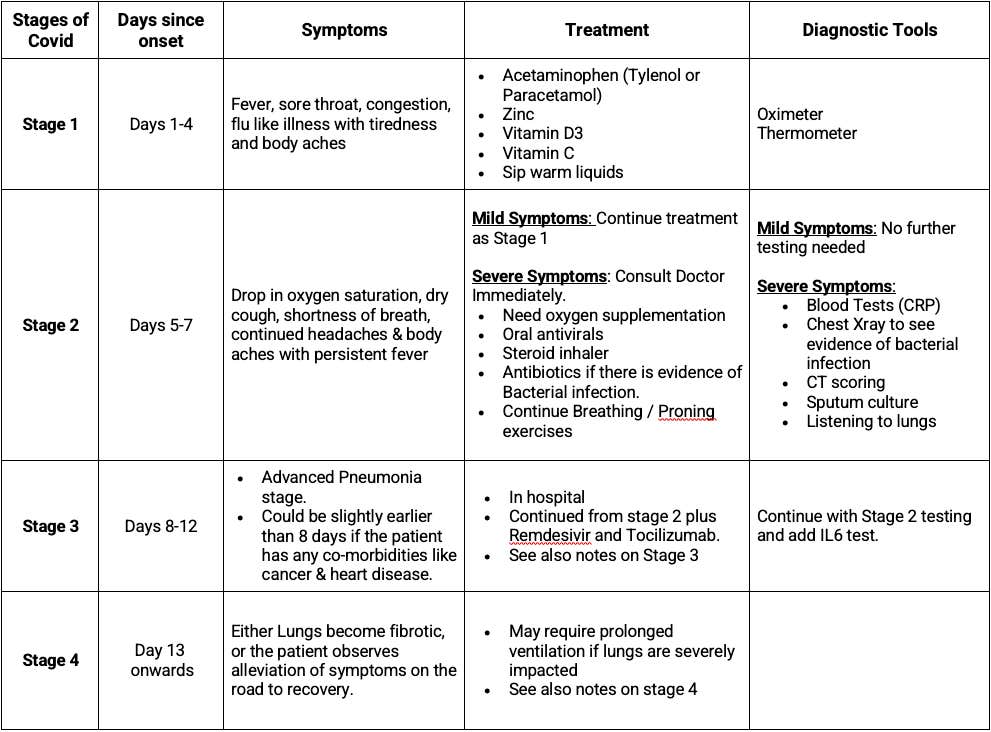Experts Tell You What You Need To Know When You Or Your Loved Ones Have Covid-19
A cheat sheet to help you understand Covid symptoms, progression, treatment and diagnostics.
 Baskaraya/Chan2545 / shutterstock.com
Baskaraya/Chan2545 / shutterstock.com Covid 19 Virus is currently wreaking havoc across many nations especially India leading to an unmanageable strain on the medical establishment and resources there. The disease that responds only to personalized and stage based diagnosis and treatment; poses an invisible threat and an enormous challenge to both doctors and patients.
While it responds well to aggressive treatment in the early stages, failure to get appropriate treatment or medication and existence of co-morbidities (other diseases) can lead to a more severe disease, hospitalization and even death in 1-2% of the cases.
At this time, we felt it is important for a short yet informed resource that people can use to determine how they can diagnose the stages of the disease and start to get a sense of what they can expect, procure the right treatment and ask their doctors the right questions to prevent some of the more serious outcomes. Please read the medical disclaimer below.
YourTango recently sat down with Dr. Harish Moorjani, an infectious disease specialist in NYC for a wide ranging discussion on the disease and its treatment.
In addition to battling covid during 2020, he has since then also advised hundreds of Covid patients in India who are consulting him on treatment methodologies as they navigate the Indian medical system.
The summary from the first of the series of interviews is presented here to make people familiar with the stages of the disease and what they can expect.
Summary Table of Covid Stages, Symptoms & Treatment

Notes on Covid Stage1 (Days 1-4)
a. Do
- Monitor and record your oxygen saturation (should be above 94 at this stage) since body functioning starts to drop below 94 oxygen level on the oximeter during Covid. Monitor pulse rate, temperature and blood pressure regularly.
- Get a RTPCR test and if positive start with isolation and quarantine. Since RTPCR test takes at least 24 hours, it is advisable to start treatment for Covid 19 while waiting for the test
- Gargle with warm water or Listerine.
- Optimize personal health: If you have co-morbidities like High Blood Pressure and diabetes, continue treatment to keep it in control
- Observe Covid Appropriate Behavior (Handwashing, Isolation, Masks and social distancing etc.)
- Control body temperature (if it goes above 101 deg F) because high fever is harmful to the body during Covid. This is problematic, potentially for heart patients (whose heart rate can go up) and diabetic patients (whose sugar may go up). Fever reducing medicines in the first stage typically will bring down temperature levels which will stay down for a while before going up. Very rarely do you see high temperatures in the first stage!
- Sip warm liquids since they will help dislodge the virus from the throat and flush it into the stomach where the body can destroy it.
- Proning exercises are an excellent idea for increasing oxygen levels in the body. This will help promote a better functioning immune system and better oxygen levels will help control the virus. Prone for as long as possible and use the oximeter to observe the increase in oxygen levels. It helps motivate patients.
b. Avoid
- Taking Ibuprofen for fever since it can sometimes enhance the receptors of the covid virus.
- Don't take steroids, anti-virals, antibiotics and steam inhalation in this stage, unless advised by your doctor.
Notes on Covid Stage 2: Days 5-7
a. At this stage we may start to see the difference between patients who have mild disease and those that will be developing more severe disease.
Mild Disease: Days 5-6 is when your fever starts to stay down, you don't see an oxygen drop and have a very mild dry cough. If so you might be headed for a milder form of Covid. If oxygen levels do not drop below 94 and you have a mild cough then patients can easily be managed by Telemedicine.
Severe Disease: Days 5-6 is when your symptoms worsen and you have a high grade fever that does not stay down with medicine, oxygen saturation drops below 94 together with dry cough and shortness of breath.
b. If you are taking good care of your health and have no comorbidities or if your disease is well controlled, then your immune system will likely control down to mild disease.
c. Steroids typically should not be given unless you have an oxygen drop. Giving steroids early on, prevents your immune system from clearing the virus but your doctor will decide what is appropriate.
d. Continue proning exercises. Keeping oxygen levels above 94 is a good way of improving your chances of a mild disease.
e. Do
- Consult a doctor who will likely arrange for oxygen supplementation, consider oral antivirals, a steroid inhaler and antibiotics ( if there is an evidence of Bacterial infection on chest x ray !)
- Antibiotics that do work:
- 2nd generation cephalosporins
- Azithromycin
- Doxycycline
- As oxygen levels fall, we move from inhaled steroids to systemic steroids that are given orally or Intravenously. Steroids like Dexamethasone, Budesonide etc. Any steroid will do. Sometimes if hospitalized during this stage, doctors will start with systemic steroids straightaway.
f. Avoid
- Excessive use of antibiotics and antivirals that can cause toxicity in the body and promote antibiotic resistance.
- Caution on prescription of antibiotics that are not effective with covid or lung infections:
- No 1st generation cephalosporins
- No Quinolones like ciprofloxacin, levofloxacin.
Notes on Covid Stage 3 (Days 8-12)
a. You are in the hospital, if you progress to this stage. You have severe pneumonia, are getting high flow oxygen and have a severe cytokine storm. The hospital management and expertise of the physician will determine the outcome of the disease.
b. You need:
- Intravenous fluids with gentle hydration to prevent the lungs from drowning. Need a fluid balance to be conducted to ensure that there is no fluid accumulation in the lungs.
- High flow oxygen with gentle ventilation.
- Intravenous steroids
- Intravenous antivirals
- Blood thinners to prevent clotting.
- Nutritional support
- Medicines like Tocillizumab 800mg to counter the cytokine storm that accompanies a drop in the oxygen levels and typically occurs between Days 9-12.
c. Note on Drugs that are typically sought after in hospitals but are very timing dependent:
- IV Remdesivir: typically 5 doses (for moderate disease) and 10 doses for people who are on a ventilator. Should be started in the first 10 days of the disease so typically by the end of stage 2 or early stage 3 and as soon as you are admitted.
- Tocilizumab. Again the timing is critical and coincides with the cytokine storm(24-48 hour window and typically days 9-12). This is when the oxygen levels are crashing and the IL6 levels in the blood are peaking.
- Tocilizumab allows the patient to recover while minimizing damage to several body systems. Without the drug, disease mostly starts to move to the clotting phase in stage 4 with high fever and higher oxygen flow rates.
- Typically given as a single shot.
- If IL6 tests are unavailable, doctors may still give the medicine within the 9-12 day window regardless of testing. The potential benefits of the drug are considerable but have been challenged by a recent study. We should note that the study itself is being challenged as inconclusive so the final determination here should be made with your doctor.
- Blood Plasma contains neutralizing antibodies. Only High titer blood plasma may be beneficial if given by Day 7 and most people are not admitted into the hospital till after day 7. It has downsides too since it is a blood product. Moreover, after day 7 the body is making its own antibodies.
Notes on Covid Stage 4 (from Day 13 to typically 2-3 weeks or longer)
a. Two paths again:
Getting better: If treatment is successful then appetite starts to come back, oxygen requirements start to come down blood tests start to improve.
Getting worse: Lungs are turning fibrotic and doctors will continue to use anticoagulants to repair damage to lungs and ventilators to aid oxygen supply and lung repair.
Advertisement
b. Recovery could take significant time depending on the extent of organ damage
c. Post covid symptoms include low grade fever, fatigue, headaches, dry cough, anxiety and can last for several weeks.
d. Rehabilitation and physical therapy may be required to promote healing
In summary, Covid 19 is a fast-moving disease, and doctors more used to conventional diseases are sometimes late to recognize that it requires quick and aggressive treatment. Consult your doctor and do not delay seeking medical advice and treatment. Managed well and in a timely manner, the outcomes should be mild and manageable.
Medical Disclaimer
Dr. Harish Moorjani, is Board Certified in Infectious Diseases and Internal Medicine. He is an Attending Physician at Phelps Memorial Hospital, Attending Physician at Hudson Valley Hospital, Medical Director In-patient Corrections Unit, Mount Vernon Hospital, Consulting Physician, Northern Westchester Hospital.

